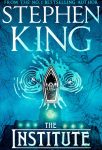There is something familiar about THE INSTITUTE, the latest release from Stephen King. Before the public got a chance to read it, speculation was rife that this was connected somehow to Firestarter, where the similarly named The Shop dealt with a different breed of special kids. King doesn’t go down this path specifically, but he does trot out a few of his greatest hits along the way.
The book begins with a bit of misdirection. Or at least a diversion. King introduces us to Tim Jamieson, a former cop who finds himself working as a “night knocker” in the small town of DuPray, South Carolina. Tim has a past but finds a kind of redemption among the people of this small southern town. This is usually where things to go horribly wrong in that town.
Yet this is not where King wants to spend his time, perhaps because he’s already doomed half of the suburban vistas of fictional America. We spend most of our time following 12-year-old Luke Ellis, a boy with remarkable intelligence and evidence of low-level telekinesis (or “TK”). Agents of the titular Institute murder his parents and secret him away to their facility in Maine. Waking up in a room almost identical to his own, he meets several other children with various abilities.
As the book’s title would imply, much of the narrative is concerned with the experimentation that takes place in Maine’s Institute. In fact, aside from Tim’s brief introduction in the first few chapters, King claustrophobically encases us within its complex walls for almost half the hefty novel. It’s here that it slows down to an incredibly measured pace, mired somewhat in the cruelty of childhood torture and the evil that organisations do.

Which would be fine if the characters gelled, but here is another rare misstep. Luke’s inner voice serves as the glue for much of lengthy middle act, but the children around him serve only as sounding boards for ideas or as stock character types. King typically writes groups of children incredibly well, and you don’t need to look much further than It or “The Body” (aka Stand By Me) for evidence of this. An exception to this is Avery, an adorable urchin with souped-up powers, but I just don’t feel as though I got to know anybody beyond their names or most recent torture experiment.
This certainly isn’t the first time King has dealt with the subject matter. After all, a lot of folks: they got a little bit of shine to them. He’s been playing with psychics since his debut Carrie in 1974. The Shining and Doctor Sleep, of course. Yet there’s a a few shades of The Dead Zone, the aforementioned Firestarter, and Peter Straub collaboration The Talisman about this book too. If it isn’t obvious, I’m an unabashed fan of King’s work, but THE INSTITUTE never seems to rise above the sum of these parts. It’s solid a black ops thriller with children in peril, but those are a dime a dozen.
There’s a running joke that Stephen King isn’t very good at endings, something that the It: Chapter Two adaptation made fun of this year. THE INSTITUTE might be an exemplar of this reputation, but it also never really takes off in the first place. Yet it’s easy to see why this has already been optioned for its own limited edition series from no less a talent than David E. Kelley: it sticks to the rails (quite literally at one point) and plays to King’s most recognisable traits.
2019 | US | WRITER: Stephen King | PUBLISHER: Scribner (US), Hachette Publishing (Australia) | LENGTH: 576 pages | RELEASE DATE: 10 September 2019





